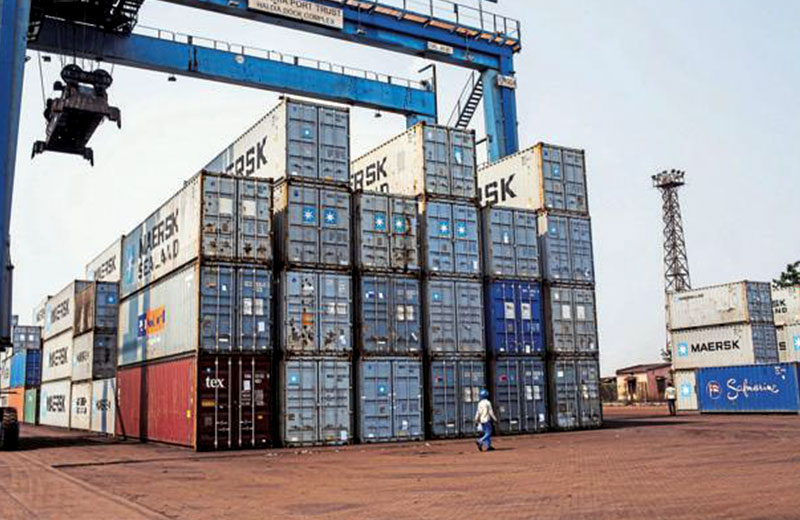[vc_row][vc_column][vc_column_text]
A proposed law to convert 11 ports run by the Union government as trusts into authorities provides for a review board to appraise stressed public-private-partnership (PPP) projects and suggest measures to revive them.
Once the Major Port Authorities Bill drafted by the shipping ministry is passed by Parliament, the Tariff Authority for Major Ports (TAMP), which regulates rates at the 11 ports, will cease to exist. The review board will then take over the residual function of TAMP.
A port consultant with a Mumbai-based firm termed tasking the review board with the review of stressed PPP projects as “an interesting plan.”
This would mean that a potentially politically risky task of bailing out stressed terminals or at least making recommendations for a bail-out would be entrusted to an agency set up through an Act of Parliament that has law makers cutting across party lines. In this way, the government could shield itself from charges of giving favourable treatment to cargo terminals at the expense of the exchequer,” he said, asking not to be named because his firm advises the shipping ministry on policy matters.
The review board plan also fits in with a separate proposal by the shipping ministry outlined in the new draft model concession agreement (MCA) for PPP projects to review concession (typically for 30 years) after 15 years to “arrive at required mitigation measures.” A concession agreement sets out the terms and conditions of a port contract.
No other infrastructure sector has such a mechanism to deal with stressed projects, the consultant mentioned earlier said. The move comes as the ministry embarks on ‘Sagarmala,’ the biggest PPP programme in the port sector yet, requiring an investment of about Rs.4.5 trillion to develop some 400 projects.
Fear of political backlash has forced the government to tread cautiously on demands from private terminal operators to migrate/move 16 existing port contracts (10 of them private)-some operating from as far back as 1997-from a regulated set-up to a market-driven pricing regime announced in 2013 for projects put for bidding since then. These terminals are governed by the tariff-setting guidelines framed by the ministry in 2005.
On an average, the existing contracts have at least 12 years left in their 30-year term. According to the new bill, the 11 ports will have freedom to set rates based on market forces.
“In case of PPP projects, the Port Authority may fix the reference tariff for purposes of bidding only. The PPP concessionaire appointed under any such PPP project will be free to fix the tariff based on market conditions and under notification to the Port Authority. The revenue share and other conditions would be as per the provisions of the specific concession agreement between the Port Authority and the PPP concessionaire appointed under the PPP project. These tariff provisions will be applicable prospectively; it will not be applicable for PPP projects already awarded by the Port Authority,” according to the draft of the new bill that will be introduced in Parliament shortly.
While the shipping ministry has incorporated greater flexibility in the proposed new MCA to effect amendments, re-negotiate terms during the course of the contract period and a much better balancing of risks between the port authority and the private firm, it will be applied only for new projects.
The ministry has said that any refinements/improvements in the existing contracts would necessitate re-bidding to discover the revenue share afresh to reflect the changed circumstances and avoid any moral hazards. This was not acceptable to the private terminal operators.
Port contracts at Union government ports are decided on the basis of revenue share-the entity willing to share the most from his annual revenue would win the deal.
“What has already been agreed to cannot be changed. The concession agreements that the ports have signed is a legal document for 30 years. So, that will not be affected; that will not be changed, that cannot be changed,” a spokesman for the shipping ministry said.
“Also, any law that is enacted cannot have a retrospective effect. All the provisions of the new law will apply only prospectively,” he said.
The ministry, according to the spokesman, has mandated consulting firm Deloitte Touche Tohmatsu India Pvt Ltd to help find ways on what can be done on the existing contracts that are facing stress and how it can be done. This is being examined at the behest of the Delhi high court that is hearing a petition filed by the Indian Private Ports and Terminals Association (IPPTA), he said. IPPTA is a private port lobby.
“There cannot be a way to migrate directly. If you have a concession signed that was finalized through an open auction, you cannot rescind or negate that. The revenue share price was determined through an open auction wherein many bidders participated and the price was discovered. Retrospectively you cannot change it. If you have to do it, you have to do it on revenue share method through a transparent process which has to be equivalent to the initial thing that was done,” the spokesman added.
[/vc_column_text][/vc_column][/vc_row]







